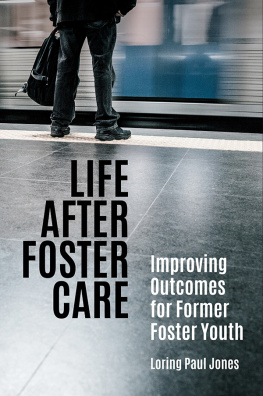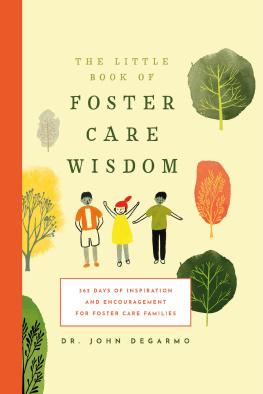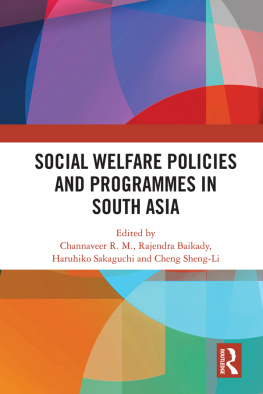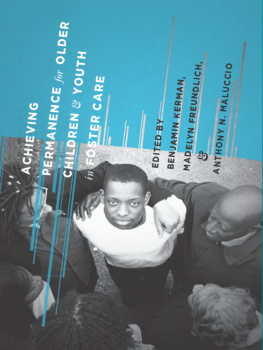Life after Foster Care
Life after Foster Care
Improving Outcomes for Former Foster Youth
Loring Paul Jones

Copyright 2018 by Loring Paul Jones
All rights reserved. No part of this publication may be reproduced, stored in a retrieval system, or transmitted, in any form or by any means, electronic, mechanical, photocopying, recording, or otherwise, except for the inclusion of brief quotations in a review, without prior permission in writing from the publisher.
Library of Congress Cataloging-in-Publication Data
Names: Jones, Loring Paul, author.
Title: Life after foster care : improving outcomes for former foster youth / Loring Paul Jones.
Description: Santa Barbara : Praeger, [2018] | Includes bibliographical references and index.
Identifiers: LCCN 2018013292 (print) | LCCN 2018026772 (ebook) | ISBN 9781440857416 (ebook) | ISBN 9781440857409 (alk. paper)
Subjects: LCSH: Foster childrenUnited States. | Foster childrenUnited StatesCare.
Classification: LCC HV875.55 (ebook) | LCC HV875.55 .J656 2018 (print) | DDC 362.73/3dc23
LC record available at https://lccn.loc.gov/2018013292
ISBN: 978-1-4408-5740-9 (print)
978-1-4408-5741-6 (ebook)
22 21 20 19 18 1 2 3 4 5
This book is also available as an eBook.
Praeger
An Imprint of ABC-CLIO, LLC
ABC-CLIO, LLC
130 Cremona Drive, P.O. Box 1911
Santa Barbara, California 93116-1911
www.abc-clio.com
This book is printed on acid-free paper 
Manufactured in the United States of America
Contents
CHAPTER ONE
Foster Care and the Transition
to Young Adulthood
Americans consider the biological and nuclear family to be the optimal environment in which to raise children. However, sometimes parents are unable to provide the expected care for and socialization of their children, or they may intentionally harm their offspring. In order to protect these children, we remove them from their homes and place them in foster care. Foster care is meant to be a safe, substitute, and temporary family. The public policy goal is to provide these children with permanency, defined as an exit from the child welfare system into a safe and long-term family (or family-like) living arrangement. The preferred permanency outcome is to reunify foster children with their biological family, but permanency can also take the form of adoption, a legal guardianship, or care provided by a relative (Adler, 2001; Wulczyn, 2004). Despite the public policy mandate to reunify children with their family of origin, some youth remain in the system until they reach the age of majority. These youth do not achieve permanency: they leave care to go to independent living or some other living arrangement. As legal adults they are essentially discharged to self (U.S.D.H.H.S., 2012).
What youth aging out of foster care share with all emerging adults are the common needs to become employed, to be financially independent, to acquire the skills to enable them to live autonomously, to develop satisfying relationships with others, and to be integrated into the community as productive and valued members. Mastering these tasks is a challenge for most young people. However, youth in foster care face unique and additional challenges because of their life circumstances both before and after they entered care. Former foster youth have never known the love and security that comes from a stable family life. Not only are they victims of maltreatment, but they also have most probably grown up in poverty. They likely have grown up in homes where there has been parental dysfunction (mental health problems, substance abuse disorders, domestic violence, incarceration, etc.) (Crosson-Towers, 2007). They have experienced the emotional trauma and mental health difficulties caused by abuse and loss, and the potential disruption of family and community ties inherent in removal from the home.
Foster care should be beneficial for children for a number of reasons. First, in removing a child from their home they receive protection from further maltreatment, which was detrimental to their emotional and physical development. Second, these children have foster parents, who will not only provide protection from further abuse but also attend to their basic needs. Third, foster children have social workers, who provide them with services including health care and mental health treatment to address the problems that have developed because of the abuse and neglect they experienced. These children may not have access to these services in their parental homes. Despite these benefits, going into foster care does pose a number of risks to a childs development that need to be addressed. Fifteen percent of former foster youth in a small nonrandom sample said going into care made their situation worse (Jones, 2015). There are a variety reasons for this negative response. Some foster children do not receive protection from abuse while in care. Maltreatment by substitute caregivers while in foster care does occur, and the needs of many children go unmet due to the lack of the provision of needed services (Kortenkamp & Ehrle, 2002; Mech, 2002). One of the problems foster children face in care is frequent placement changes, which has been associated with many of the problems examined in this book (Ryan & Testa, 2005). Frequent moves while in care can result in additional psychological trauma as children reexperience the trauma from earlier removals.
Youth also enter care with socioeconomic disadvantages that foster care does not erase, and these disadvantages exert an adverse effect on emerging adults, even after long stays in care. Some of the research reported in this book indicates that many former foster youth might not do any better than, and in some cases they do not do as well as, nonfoster youth who grew up in poverty in meeting the tasks of emerging adulthood (Berzin, 2008; Buehler, Orme, Post, & Patterson, 2000; Kerman, Wildfire, & Barth, 2002). Youth leaving foster care also face the challenge that comes with the sudden loss of services and support.
The Transition to Adulthood and Foster Youth
Most of us remember the time of transition from adolescence to adulthood as one of excitement tinged with anxiety. We may have even watched our own children struggle through the period in life called emerging adulthood by Arnett (2000, 2004) and assisted them with significant support during this period of change. During this transition phase, a youth is moving from familiar situations into new opportunities and challenges. Anxiety may emerge from the loss of customary environments and concern about ones capacity to meet new challenges. The ease of this transition is dependent not only on a persons own internal resources but also on the support, both tangible and intangible, provided by others. Most of us had the emotional and financial support of parents and family, and we knew we had a fallback position in the family home when we needed refuge. Many of us have also had mentors to help guide us in making career decisions.
The theory of emerging adulthood connotes a changing notion of adulthood, which recognizes that it is taking longer than it once did to become an adult in U.S. society. It is not only the elongated time period it takes to reach full adulthood that is different; youth need more support during the transition period than has been the case in the past. Youth are depending on their parents and family for support until a much later age than had formerly been the custom in U.S. society.
In this difficult and changing context, foster youth are making two transitions. The first transition is the one they share with all youth: the movement into emerging adulthood. The other transition is leaving the child welfare system and its support, protection, and supervision and going to independent living. These youth may not receive the benefit of the elongated period of preparation for adulthood that is inherent in the concept of emerging adulthood. Youth are not expected to become adults overnight just because they meet a chronological age marker, but that is what could, and often does, happen to a youth being discharged from care. Foster youth not only lose the child welfare systems support on leaving care but often do not have the supports from parents or family that most youth can expect as they encounter the challenges of early adulthood. Family ties may be weak or broken because of prior abuse and/or years in care away from family. Even when ties with the family of birth are intact, families may find it difficult to help. Foster youth often come from families with multiple problems and limited resources, and their parents may be unable or unwilling to provide them with assistance. Social policy expects youth to be self-sufficient without parental support or a publicly provided safety net. In short, these youth risk leaving care without the same help that most young people need, depend upon, and receive. The poor outcomes reported in this book are partly a result of this lack of support.
Next page







